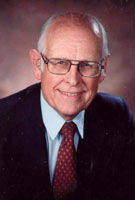
Maurice "Maury" Albertson believes the idea of the international Peace Corps could give Kerry's campaign a boost similar to the one Kennedy's campaign received when he first advocated the founding of a U.S. corps. But he has not heard back from Kerry on his proposal
$10,000 grant led to Peace Corps
Co-founder worked to get aid to hungry and, at 85, still does
By Kit Miniclier
Denver Post Staff Writer
FORT COLLINS - Maurice "Maury" Albertson, retired director of Colorado State University's Research Foundation, remembers well the events that shaped the U.S. Peace Corps.
Many consider Albertson a co-founder of the volunteer organization, which Monday celebrates its 43rd anniversary.
It all began to take shape in 1960, when Albertson won a highly competitive federal grant of $10,000 to study for Congress "the advisability and practicality" of something called a "Point-4 Youth Corps."
"I pulled together a faculty of 100 person-years of working in Third World countries, and we conjured up a proposal," he recalled during a recent interview over hot chocolate and brownies.
Advertisement
President Kennedy later created the Peace Corps by executive order on March 1, 1961. Since then, 170,000 volunteers have served in 137 countries. Those totals include 7,533 current volunteers and trainees working in 71 countries. In fiscal 2003, the organization had a budget of $295 million.
Albertson, who understands the importance of sending bright young Americans overseas - without guns - to build friendships and understanding while helping in developing countries, had the background and energy to get the job done.
At the time he began working on his proposal, he had recently returned from Bangkok, Thailand. There, he had pulled together a nucleus faculty and graduate student body to form the School of Civil Engineering, which ultimately expanded to became the prestigious Asian Institute of Technology.
Albertson initially worked closely with the first Peace Corps director, President Kennedy's brother-in-law, Sargent Shriver, to mold the organization.
He first heard from Shriver at 2 a.m. on a Sunday. "He wanted me in Washington that morning, and I was just back from a trip," he said.
They reached a compromise.
During the weeks before Congress approved funding for the new Peace Corps, "Shriver never ate a meal without at least one member of Congress," Albertson said.
A growing task force hammered out many details that would shape the fledgling corps of volunteers. Albertson was not involved in that.
But the first director of Peace Corps operations, Warren Wiggins, says Albertson's early role was vital. His initial feasibility study "was right on target, a credible report which was widely circulated. Maury was always eager and always helpful," Wiggins said.
The idea of an overseas service corps of American college and university graduates was first raised in the late 1950s by Sen. Hubert Humphrey, D-Minn., and Rep. Henry Reuss, D-Wis.
The concept had deep roots, Albertson noted, reaching back to the "Thomasites" of 1901 and the American Friends Service Committee, founded in 1917 by members of the Religious Society of Friends in the United States to provide young Quakers and other conscientious objectors to war an opportunity to work overseas peacefully in time of war.
The "Thomasites" were named after the U.S. Army Transport Thomas, which carried 540 high-minded American teachers and some of their families to the Philippines in 1901 to teach English.
The Friends have worked in trouble spots around the world since World War I, providing emergency relief to refugees.
Shriver and Albertson, a lifelong Republican, had their differences during the process of hammering out the details of the Peace Corps.
"I recommended ROTC-type training for the volunteers," Albertson said. "He just exploded. It was the only time I saw Sarge lose his cool, and I backed off.
"He asked me to set up a mentor and evaluation program so we didn't have to make the same mistakes twice."
Shriver also turned down Albertson's plan to rely on college and university professors for that program. He preferred "newspaper reporters and lawyers because they are used to asking questions."
But the two agreed on giving volunteers two-year tours of duty, enough time to get acquainted with the land, people and customs while sharing their skills in education, health, agriculture, urban planning, skilled trades, forestry, sanitation or technology.
Now 85, Albertson says he would like to see "an international (worldwide) Peace Corps, patterned after the (U.S.) Peace Corps but under the United Nations, to provide capable, inexpensive personnel" to work in service centers and villages around the globe.
"This would mean a major effort to get the U.N. to pull together all countries who have money to eliminate poverty for 4 billion people," said Albertson, who sent a presentation outlining the idea to Democrat John Kerry's presidential campaign.
He blames "American arrogance and seeming indifference to the devastating poverty of more than half the world's population" for the hostility that led to the terrorist attacks of Sept. 11, 2001.
Albertson has served as a consultant at various times to the World Bank, UNESCO, the Peace Corps and other agencies in developing countries but says the programs haven't helped the masses.
"The many billions of dollars those agencies have put into the less-developed countries in the past 50 years have increased the gross national product of each country and the wealth of the 20 percent of the population who control the country," he said.
"But the number of people living in poverty (less than $2 a day) has increased and the gap between the rich and the poor has increased," he asserts in his presentation for a massive global effort to drastically reduce poverty and hostility and find a renewable, nonpolluting energy.
Albertson believes the idea of the international Peace Corps could give Kerry's campaign a boost similar to the one Kennedy's campaign received when he first advocated the founding of a U.S. corps. But he has not heard back from Kerry on his proposal.
